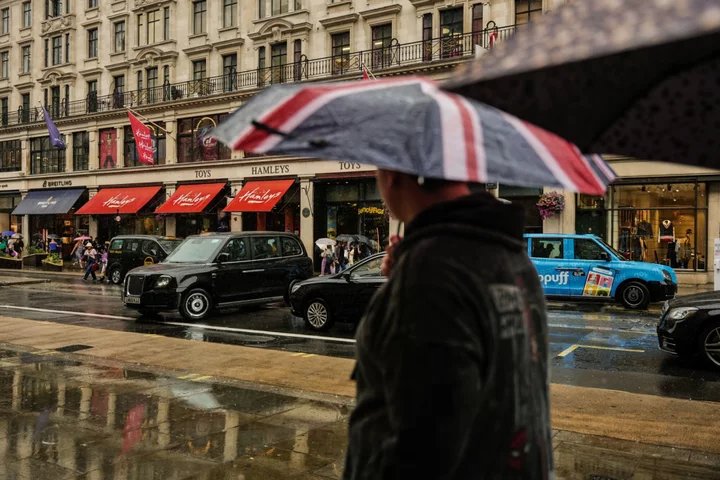UK retail sales fell more than expected in July after a spell of cool and rainy weather kept people out of shops.
The volume of goods sold in stores and online fell 1.2% last month after an 0.6% gain in June, the Office for National Statistics said Friday. Economists had forecast a 0.6% month-on-month decline.
The figures mark the first time in four months that sales have fallen short of expectations and may indicate consumers are starting to buckle under the weight of soaring prices and interest rates. The Bank of England is trying to slow the economy to rein in inflationary pressures, triggering an unexpected increase in unemployment in the second quarter.
“It was a particularly bad month for supermarkets as the summer washout combined with the increased cost of living meant sluggish sales for both clothing and food,” said Heather Bovill, deputy director for surveys and economic indicators at the ONS. “Department store and household goods sales also dropped significantly.”
The pound slipped 0.2% against the dollar to 1.2720 after the data, and was the worst-performing Group-of-10 currency in early European trading.
While the volume of sales has been falling, the value of goods purchased has rocketed since the start of the cost-of-living crisis in 2021, leaving consumers spending more to buy less.
The retail figures contrasted with stronger-than-expected reports for economic growth, wages and inflation in the past week. Helen Dickinson, chief executive officer of the British Retail Consortium, said customers are spending more cautiously and scaled back on big-ticket purchases, especially on computers and furniture. Book sales did better.
“Retailers are hopeful that the coming months will provide a boost to spending, as England fans celebrate the Women’s Football World Cup Final this weekend, families start their back-to-school shopping and university students ready themselves for the new academic year,” Dickinson said.
Clothing sales fell, which the ONS attributed to lower footfall in shops as wet weather spread across the UK. Food sales were also 2.6% weaker, which customers said was due to higher prices. Supermarkets reported lower clothing sales and also a drop in the volume of food people took home.
Total sales in non-food stores, including department stores, fell 1.7% in July. Fewer people visited shops during a month that the Met Office said was the sixth wettest July on record.
The drop in sales “probably had more to do with the unusually wet weather than the impact of higher interest rates on consumer spending,” said Ruth Gregory, deputy chief economist at Capital Economics. “But with the Bank of England’s interest rate hikes still feeding through and consumer confidence falling, we remain downbeat on the outlook for overall spending this year.”
“Although inflation is decelerating, the price of food in particular has been stubbornly high, impacting both volumes and appetite for spending in more discretionary categories,” said Erin Brookes, European retail and consumer lead at Alvarez & Marsal. “Consumer spending in non-essential categories appears subdued, yet travel bookings are reported to be spiking due to the dreadful weather.”
She said last month’s slump could “become a trend” unless tourism spending in August, or shopping for the new school year in September, boosted sales.
It marked a sharp reversal from June’s warmer than usual weather, which spurred surprisingly strong retail figures that month.
Online retailers picked up some of the slack, with volumes up by 2.8%. As well as benefiting from the weather, they also offered a variety of promotions. Amazon.com Inc. had its “prime day” sales during the month.
The proportion of sales completed online was its highest since February 2022, at 27.4%. Online sales hit records during the pandemic as consumers shied away, or were prevented by lockdowns, from visiting shops.
“The wet weather in the UK tested which sectors are rainproof,” said Jon Boland, general manager of Clover, which manages payments for retailers. “We see that garden centers and DIY stores had a tough grind with consumers opting to take shelter indoors. Women’s clothing sales dried up, with women likely seeing no reason to replace their summer wear amid the unseasonal weather. Clothing sales were largely driven by family clothing.”
Automotive fuel sales volumes rose by 0.7% in July, helping support the headline figure, after a decline the previous month.
--With assistance from Joel Rinneby and Alice Gledhill.
(Updates with comment and market reaction from the fifth paragraph.)

